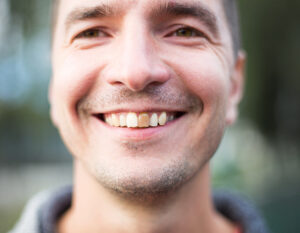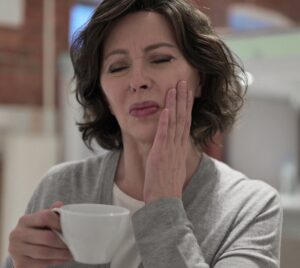After primary teeth (or “baby teeth”) are replaced by permanent teeth, we know that those are the teeth we will live with for the remainder of our lives. Over the course of many lifetimes, however, accidents, injury and decay can lead to losing a tooth.

Losing one or two permanent teeth as we age is not unusual. However, tooth loss should never be an expectation. Teeth, properly cared for, are designed to last a lifetime. As a
dentist in Macomb County, that’s what we strive to help our dental patients achieve.
A lost tooth should be replaced as soon as possible, for several reasons. Each tooth serves as a supportive bolster to surrounding teeth. The tooth on each side and above (or below) are necessary for each tooth to maintain its proper position.
Additionally, a natural tooth’s roots serve to nourish and stimulate the jaw bone. When a tooth root is missing from the jaw bone’s foundation, the bone mass begins to decline. This bone loss, known as resorption, can lead to changes in facial appearance, bite misalignment and higher risk for additional tooth loss.
It is helpful to understand the structure of a natural tooth. Teeth are not one, solid mass. They are “living” bone made up of three layers. On the outside of the tooth is the protective enamel layer. This covers the dentin layer, which surrounds the pulp. The pulp is an inner chamber of vital components, such as nerve endings and blood vessels.
Occasionally, we see a patient who has a “dead tooth”. In many cases, this occurs due to an injury. Trauma to the tooth (often from sports or accidents) can damage the blood vessels inside the tooth. When the blood supply to the pulp is severed, the nourishing contents within the pulp chamber die.
Any type of major injury can be serious enough to impact the well-being of a tooth. In addition to trauma from an auto accident, falling on the head, or experiencing a blow to the jaw,
teeth grinding can also be a cause of tooth damage. Trauma can interfere with the blood supply to the tooth’s root, which may leave the tooth useless. This usually leads to the need for its removal.
Another reason a dead tooth occurs is due to decay.
Cavities and bacteria that get into the tooth can affect the nerve fibers and destroy the nerve entirely. Healthy pulp will become inflamed as a way to fight bacteria. Unfortunately, this inflammation shuts off blood flow into the pulp, eventually killing it. The same is true for a tooth that has been overly-repaired with fillings, even before the decay reaches the pulp.
For most people, a dead tooth reveals itself as it becomes discolored. This change in color occurs from damage to the blood vessels. Initially, it can lead to a pinkish color and eventually turn a gray-black. If the tooth dies from decay, it may begin by turning yellow, gray, light brown or black and become more discolored as it decays further.
In addition to a change in the tooth’s color, some people become sensitive to hot or cold. A dead tooth can also cause bad breath or swelling around the gum line. If you see that one of your teeth has begun to turn yellow, gray, or even displays signs of blackening, that tooth may be dead.
Each tooth is different, so when it begins to die there may be mild discomfort or cause extreme pain. The pain level is determined by whether the nerve is dying or if an infection has led to an abscess. If an abscess is present, it is usually accompanied by swelling, a sore on the inside of the gum, or strong breath odor. Eventually, the tooth will start to loosen and require removal so the infection can be resolved.
If the tooth is mostly intact, a
root canal and a filling or
crown may prevent the need for removal.
In a root canal, the dead pulp is removed through a tiny hole in the tooth’s top. Once the tooth’s interior is cleaned, a filler is applied. Because a dead tooth can become brittle, a crown is typically placed over the tooth to strengthen and support it.
If a dead tooth is too damaged, however, it will likely need to be removed. The tooth can be replaced with a
dental implant,
crown & bridge, or a partial. Dr. Barbat will discuss the options that are best for you and explain the process involved.
As a
Neuromuscular Dentist, Dr. Barbat has a unique understanding of cranio-facial interactions in biting, chewing, speaking and in resting positions. Neuromuscular dentistry is based on the understanding that all crainio-facial structures must work harmoniously. Because disharmony in one area can be far-reaching, the results can lead to costly repairs and painful problems, including frequent headaches and migraines.
This area of dentistry provides patients of
Dr. Barbat with neuromuscular balance in all types of dental care. Using this advanced skill level and technology, she is able to correct problems associated with bite misalignment or TMJ disorder, even problems that have existed for many years.
We strongly advise protecting teeth by wearing a mouth guard during sports and activities such as biking. Avoid using your teeth for the wrong purposes, like chewing ice or opening things.
If you grind your teeth during sleep, a nighttime mouth guard is recommended. Our
Shelby Twp dental office creates custom-made mouthguards that are comfortable and are not bulky.
For healthy teeth, it’s also important to maintain a thorough oral hygiene routine at home. This includes brushing twice a day with fluoride toothpaste, flossing daily, eating a low sugar diet and drinking plenty of water. Tooth decay — one of the leading causes of a dead tooth — is almost entirely preventable.
Too, be committed to your 6-month dental check-ups and
cleanings. These visits allow us to respond to tooth decay and signs of trauma early.
If you are seeking a dental office that provides complete dental services, call
586-739-2155 or tap here to request a free
consultation. New patients are always welcome and there is no charge for a private consult.


